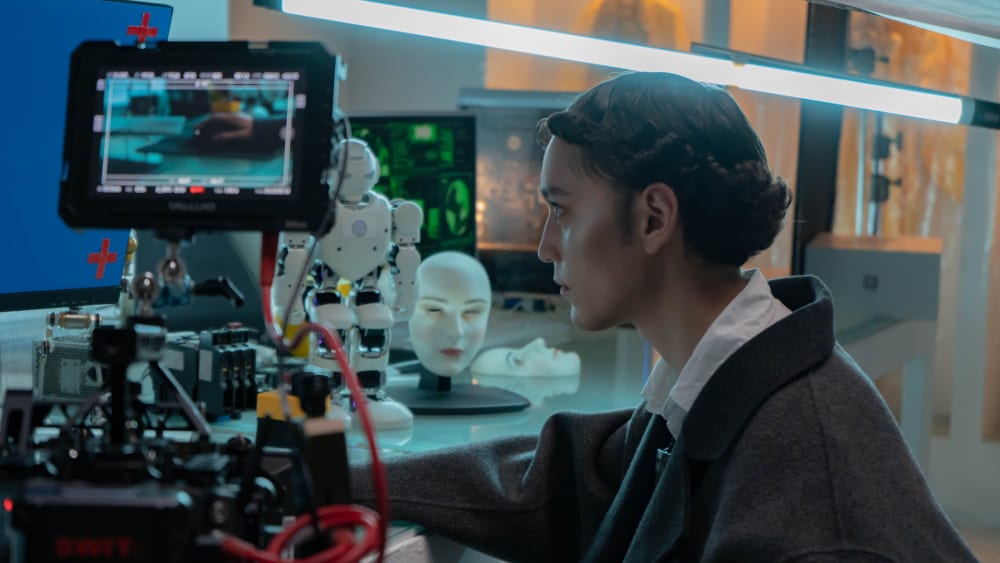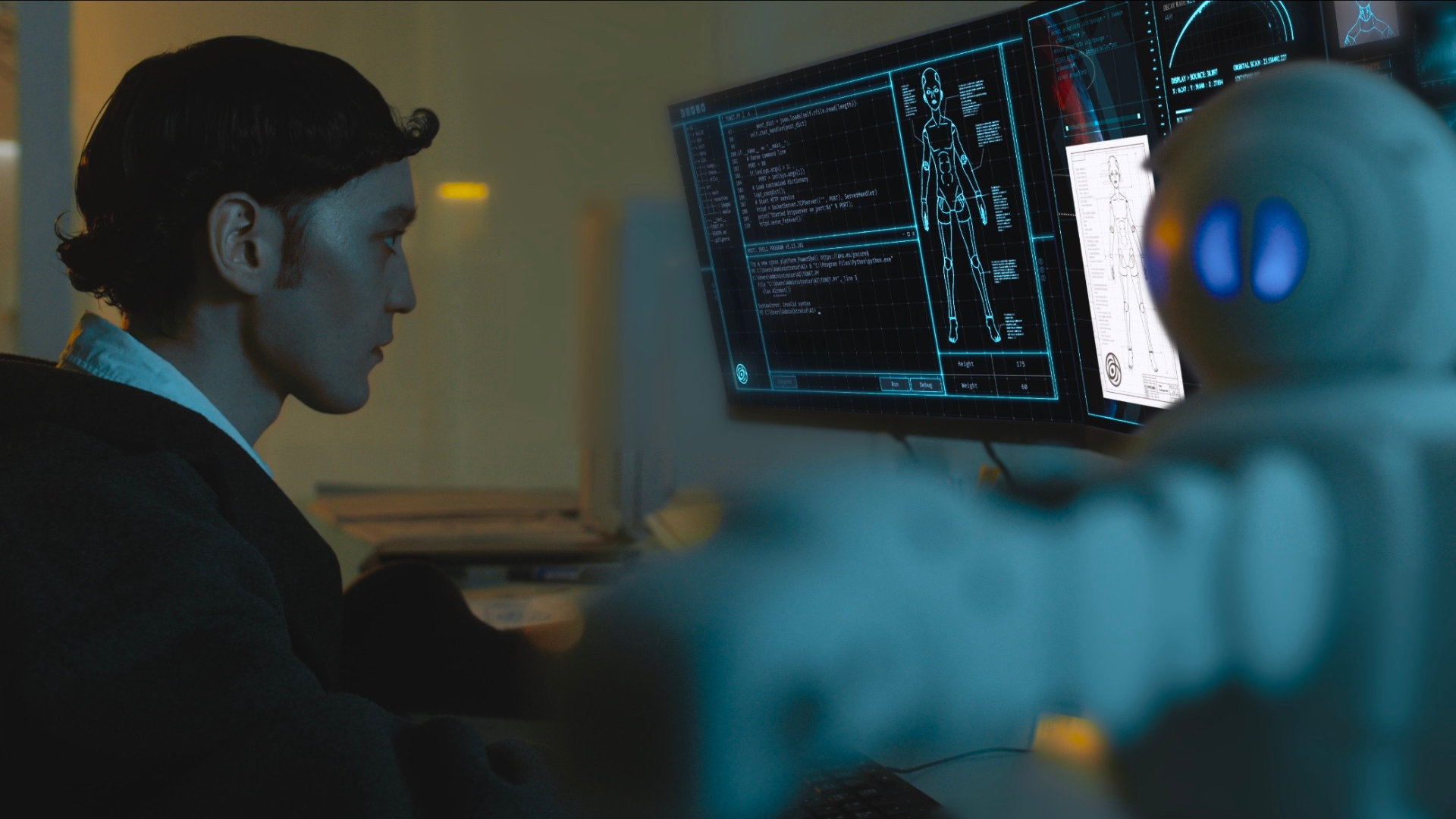
LCF23: Navigating the semantic minefield of genderfluidity with Hazel Dong

- Written byLubna Hussain
- Published date 04 February 2023

LCF Postgraduate Class of 2023 features work from our three world-leading design, communications and business schools to demonstrate how LCF students look beyond the traditional notions of fashion to imagine a new and exciting future. A bustling two-day exhibition will offer a unique perspective into LCF’s postgraduate work by immersing visitors in the future of fashion through displays of design, film, photography, VR and more from LCF’s boundary-breaking students at the infamous Truman Brewery in east London. In light of the celebrations, we're finding out more about work from this year's graduating cohort.
Hazel Dong, MA Fashion Film and Digital Production graduate runs us through her final project ‘Semantic error’ which explores identity through a science fiction short film. We interview her to find out more about the nature of the underlaying messages and where her inspiration derives from.
Please tell us about your final graduate piece 'Semantic error' what does the word semantic mean in this instance?
Semantic error in programming languages refers to errors that don’t catch during the compilation of a program. The compilation will generally run fine, but with the wrong results. A semantic error occurs when a statement is syntactically valid but does not do what the programmer intended. (Alex, 2023)
The statement above fits well with my story where the programmer is doing everything right, but the result is different from what he intended. Hence, the name. Subjectively, I would interpret the term ‘semantic’ as the logic of a consciousness under an order and that, when it changes, it may be wrong from the programmer's point of view, but its 'syntax' is not wrong, the existence is correct, only the result does not correspond to the general logic.
‘Notes On The Synthesis of Form’ says: Caught in a net of language of our own invention, we overestimate the language's impartiality. My film is a search for the narrative possibilities of this "unjust language".
Sci-fi allows us to explore ideas and concepts that are not possible in any other type of story or setting, what are your thought behind exploring this genre?
I am interested in sci-fi, which transcends realistic contexts and pushes time, space, technology, and imagination to their limits. As a child who witnessed the beginning of the gradual spread of computers, I know that the development of technology has changed life dramatically. With the influence of multiculturalism, new things have a strong appeal to me. I watched the film ‘Ghost in the shell’, which had a novel world view that I found exciting and planted a sci-fi seed in my mind.
Science fiction explores the challenges of the mainstream mode of thought and the philosophical conception of subversive metaphor, which provides enough imagination space for my subsequent creation.


'Semantic error' has underlying themes of identity when it comes to gender, body image and social dynamics. What do these themes mean to you?
In exploring the identity, I mainly want to illustrate the blurring of the boundaries of binary relationships, whether it's gender, body, or social dynamics. As a child raised on Chinese Taoist philosophy, I hoped for a "semantic error". When semantics blur, there is no absolute right or wrong. Things are always developing and changing, and so is identity.
Your final project is a unique and thought-provoking film that leaves the viewer with plenty of questions when it ends with 'Tenet' the cyborg entering another world. How would you like your audience to connect with it?
The ‘new world’ behind garbage stations is a fantasy of non-binary opposites, whereas in ‘old world’ of the programmer, it cannot embrace. Everything in the beyond is in harmony.
I used 3D techniques to construct a place similar to Peach Blossom in ‘Secret Love in Peach Blossom Land’, which is a symbol of utopia in Chinese philosophy. But after three quick cut shots as the camera pulls away, it's still the lab scene. Is the new world a happy ending? Or a cover? Is it a new challenge? In the end, I hope to arouse the audience's thinking about the future of human civilisation from the world of Cyborg. In the future, how many garbage stations are still waiting for us?


What research have you done that reflects in your work?
I have done a lot of theoretical research on Cyborg aesthetics and Taoist philosophy. ‘A Cyborg Manifesto’ and on 'The Left Hand of Darkness’ are my main inspirations. In Haraway's theory, a Cyborg's concept rejects strict boundaries, especially Descartes’ dualism. Based on this, I explored male dominated discourse, feminine objectification, and the blurring of identity, and it was reflected in the setting, color, and shot of my film.
Was there any challenges during the production of your final film, if so, how did you overcome them? Are there any key moments you’d like to share?
I worked with more than 30 people in total during the film making process which was a big challenge for me as directing a large group can be difficult especially when it comes to communication. Where we often had discrepancies, it was key to mediate a plan to help everyone feel heard and happy with decisions to move forward. And though it was difficult at times, going through those obstacles really helped me build confidence plus it helped that my team members are just excellent. These moments are still the highlight for me as I really enjoyed talking through the procedures with the crew during the production process as this is where we made developments and where the most creative activities took place. The script, cinematography, lighting, art, styling, and so on have to cooperate with each other, and promote each other, I often get inspired by the discussions, which boosted my creativity.



- Stay up to date with LCF Postgraduate Degree Show 2023
- View more work on the UAL Graduate Showcase
- Find out more about LCF's Move
- Explore LCF Postgraduate courses
- What’s on at LCF: open days and events